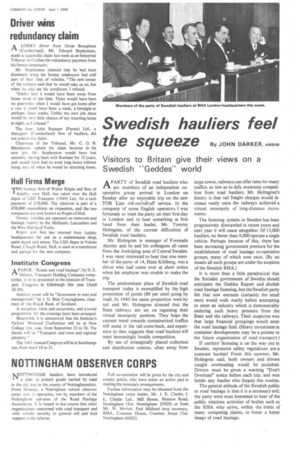Swedish hauliers feel
Page 27

If you've noticed an error in this article please click here to report it so we can fix it.
the squeeze By JOHN DARKER, Amaim
Visitors to Britain give their views on a Swedish "Geddes" world
APARTY of Swedish road hauliers who are members of an independent cooperative group arrived in London on Sunday after an enjoyable trip on the new TOR Line roll-on/roll-off service. In the company of some English operators I was fortunate to meet the party on their first day in London and to hear something at first hand from their leader, Mr. Tommy Holmgren, of the current difficulties of Swedish road hauliers.
Mr. Holmgren is manager of Forenade Akerier and he and his colleagues all came from the Jonkaping area of Central Sweden. I was most interested to hear that one member of the party of 14, Hans Kihlberg, was a driver who had come over at short notice when his employer was unable to make the trip.
The predominant place of Swedish road transport today is exemplified by the high proportion of goods (80 per cent) going by road. In 1940 the same proportion went by rail and Mr. Holmgren stressed that the State railways are set on regaining their virtual monopoly position. They hope the current trend towards containerized traffics will assist in the rail come-back, and experience to date suggests that road hauliers will meet increasingly hostile competition.
By use of strategically placed collection and distribution centres, often away from large towns, railways can offer rates for many traffics so low as to defy economic competition from road hauliers. Mr. Holmgren's theory is that rail freight charges would increase vastly once the railways achieved a virtual monopoly of long-distance movements.
The licensing system in Sweden has been progressively dismantled in recent years and next year it will cease altogether. Of 13,000 hauliers, no fewer than 9,000 operate a single vehicle. Perhaps because of this, there has been increasing government pressure for the establishment of road haulage co-operative groups, many of which now exist. (By no means all such groups are under the auspices of the Swedish RHA.)
It is more than a little paradoxical that the Socialist government of Sweden should anticipate the Geddes Report and abolish road haulage licensing, but the Swedish party felt that new entrants (certainly the small men) would walk warily before attempting to enter an industry which is demonstrably enduring such heavy pressure from the State and the railways. Their suspicion was that large financial groupings would enter the road haulage field. (Heavy investment in container developments may be a pointer to the future organization of road transport.) If carriers' licensing is on the way out in Sweden, repressive safety regulations are a constant burden! From this summer, Mr. Holmgren said, both owners and drivers caught overloading would be punished. Drivers must be given a warning "Don't Overload" notice before each trip, and woe betide any haulier who forgets this routine.
The general attitude of the Swedish public to road haulage is that it is a necessary evil; the party were most interested to hear of the public relations activities of bodies such as the RHA who strive, within the limits of many competing claims, to foster a better image of road haulage.




















































































































